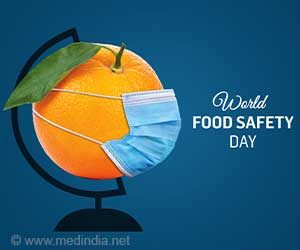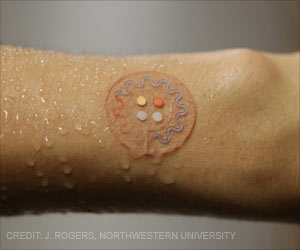World Food Safety Day 2024 emphasizes "Food Safety: Prepare for the Unexpected," promoting awareness, collaboration, and technology to tackle food safety challenges globally.
- The theme for World Food Safety Day 2024 is "Food Safety: Prepare for the Unexpected," emphasizing preparedness for unforeseen circumstances
- Foodborne illnesses affect millions globally, highlighting the need for robust preventative measures
- Technology offers innovative solutions for enhanced monitoring, improved food processing, and empowering consumers and businesses
World Food Safety Day
Go to source).
1 in 6 people get sick from unsafe food every year. #worldfoodsafetyday #foodsafetyforall #medindia’
Theme
World Food Safety Day is celebrated annually on June 7th. The theme for World Food Safety Day 2024 is "Food Safety: Prepare for the Unexpected." This theme emphasizes the importance of preparedness for any situation that could jeopardize food safety, including accidents, inadequate control measures, food fraud, or natural disasters.History
The first World Food Safety Day was held in 2019, following a resolution passed by the United Nations General Assembly in 2018. The initiative aims to strengthen international cooperation in ensuring safe and healthy food for everyone.Significance
Foodborne illnesses are a significant global health concern, affecting millions of people every year. Contaminated food can cause a variety of illnesses, ranging from mild stomach upsets to life-threatening conditions. World Food Safety Day plays a crucial role in:Raising awareness:
The day serves as a platform to educate consumers, producers, and governments about the importance of food safety practices.Promoting collaboration:
World Food Safety Day encourages collaboration between all stakeholders in the food chain, from farmers and producers to retailers and consumers, to implement effective food safety measures.Highlighting solutions:
The campaign promotes best practices and solutions for ensuring food safety throughout the entire food supply chain.Empowering consumers:
By raising awareness, World Food Safety Day empowers consumers to make informed choices about the food they purchase and prepare.Preparing for the Unexpected
The 2024 theme, "Food Safety: Prepare for the Unexpected," underscores the need for proactive measures to ensure food safety. Here are some ways to prepare for the unexpected:Invest in food safety training:
Individuals involved in food handling, from farmers to restaurant staff, should receive proper training on safe food handling practices.Develop robust food safety plans:
Businesses and organizations involved in the food chain should establish comprehensive food safety plans that identify potential hazards and outline mitigation strategies.Maintain proper sanitation:
Regularly cleaning and sanitizing food preparation surfaces, equipment, and utensils is crucial to prevent contamination.Practice proper food storage:
Food should be stored at appropriate temperatures to prevent the growth of harmful bacteria.Be informed:
Stay updated on food recalls and advisories issued by regulatory agencies.By working together and being prepared for unforeseen circumstances, we can ensure a safer and healthier food supply for everyone.
Impact of Foodborne Illnesses
Foodborne illnesses have a significant impact on public health and the economy. According to the World Health Organization, an estimated 600 million people fall ill after eating contaminated food each year, resulting in 420,000 deaths. These illnesses can lead to long-term health issues and substantial economic losses due to medical costs and lost productivity. Highlighting these statistics underscores the critical need for food safety measures.Tips for Safe Food Handling at Home
- Clean: Wash hands, utensils, and surfaces often to prevent the spread of bacteria.
- Separate: Keep raw meat, poultry, seafood, and eggs separate from ready-to-eat foods to prevent cross-contamination.
- Cook: Cook foods to the right temperature to kill harmful bacteria. Use a food thermometer to check.
- Chill: Refrigerate or freeze perishable foods within two hours to prevent bacterial growth.
- Report: Be aware of and report any food safety concerns to local authorities.
The Role of Technology in Food Safety
Technology is revolutionizing the way we approach food safety, offering a range of innovative solutions to minimize risks and ensure a safer food supply chain from farm to fork.Enhanced Monitoring and Tracking:
- Sensors: Real-time temperature and humidity sensors embedded in storage facilities, transportation vehicles, and even packaging can monitor conditions and trigger alerts if they deviate from safe parameters.
- Blockchain Technology: Blockchain creates a secure, transparent record of a food's journey, allowing for faster identification of contamination sources during outbreaks.
- Internet of Things (IoT): Connected devices throughout the supply chain can collect and transmit data on food origin, processing, and storage, enabling better traceability and risk management.
Improved Food Processing and Storage:
- Smart Packaging: Indicators on packaging can change color or emit signals to indicate spoilage or tampering, alerting consumers and retailers to potential hazards.
- Automated Cleaning and Sanitation: Robots and automated systems can perform thorough and consistent cleaning and sanitization of food processing facilities, minimizing the risk of human error-related contamination.
- Precision Agriculture: Technologies like drones and advanced sensors can help farmers optimize crop health and minimize the use of pesticides, leading to safer and more sustainable food production.
Empowering Consumers and Businesses:
- Mobile Apps: Educational apps can provide consumers with on-demand information on safe food handling practices, food recalls, and proper storage techniques.
- Data Analytics: Advanced data analysis can identify trends and patterns in foodborne illnesses, allowing for targeted interventions and prevention strategies.
- Digital Training Platforms: Online training modules can educate food handlers on safe practices, ensuring consistent knowledge and compliance across the industry.
- World Food Safety Day - (https://www.who.int/campaigns/world-food-safety-day/2024)
Source-Medindia
















